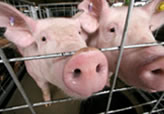Hog Farming Resources
The focus of this page is to provide brief descriptions and links to key industry, government and educational resources available on the Hog Farming industry in general and specifically in North Carolina.
Industry Associations
- National Pork Board: Quasi-government group of pork producers and importers appointed by US Secretary of Agriculture. The board promotes industry research and consumer information to enhance the competitiveness of US pork products. It is headquartered in Des Moines, IA.
- National Pork Producers Council: National association of pork producers with membership from 43 states and offices in Washington, DC and Des Moines, IA. The council conducts public policy outreach advocating for reasonable legislation and regulation and protecting the livelihood of 67,000 pork producers in the United States. The North Carolina Pork Council is North Carolina’s state association affiliated with the organization.
- North Carolina Pork Council (NCPC): The oldest state pork producer organization in the nation. A not-for-profit organization that promotes and educates on socially responsible and profitable pork production in North Carolina. NCPC is located in Raleigh, NC and has 7 district divisions throughout the state each with directors serving on the NCPC Board.
Education & Training
- North Carolina Pork Conference: Annual conference organized by the North Carolina Pork Council to present major developments in the industry and serve as a space for various actors in the industry to meet. Educational seminars are offered with some of the classes counting towards renewal of required state level certifications.
- North Carolina State University Animal Science Department: Offers courses on a variety of topics to help improve sustainable production and efficiency and increase quality of animal products in North Carolina. Coursework covers both scientific and production topics and offering hands on training at the swine education unit. Students may select a two year or four year program.
- Swine Science Online: First online undergraduate program for those interested pork industry careers. Coursework focuses on production aspects as well as relevant industry issues using a combination of scientific principals and managerial skills. The online course is operated through a consortium of six US universities including North Carolina State University.
Government Resources
- North Carolina Department of Agriculture and Consumer Services: Government body over all North Carolina agriculture and charged with maintaining statistical data on production. Hog production is regulated under the Meat and Poultry inspection division, which inspects and certifies meat products in NC and maintains a list of certified processing facilities.
- North Carolina Department of Environment and Natural Resources: Oversee the Certification of Operators of Animal Waste Management Systems, a license required by the state of North Carolina to handle animal waste. To be certified, producers must complete a 10 hours training program and pass a state examine. To maintain certification, producers must complete 6 additional hours of training every three years.
Web-based Resources
- National Hog Farmer: A digital and print business magazine based out of Minneapolis, MN. The monthly publication covers production technology, business management, and other issues important to professional pork production.
- North Carolina State University, College of Agriculture and Life Sciences, Waste Management Programs: A comprehensive website detailing the Smithfield Agreement and the new technologies being developed to combat environmental problems resulting from swine waste.
- Southern Farm Network: Website focused on agriculture in North Carolina, South Carolina, and Virginia. The Southern Farm Network covers many agricultural products, including hogs. The website offers overviews of future markets and recent news relevant to the region and associated industries.
Books, Reports & Articles
- Driscoll Adam and Bob Edwards. (2014). “From Farms to Factories: The Social and Environmental Consequences of Industrial Swine Production in North Carolina.” Twenty Lessons in Environmental Sociology, 2nd edition. Edited by K. A. Gould and T. L. Lewis. New York: Oxford University Press.
- Stull, Donald and Michael Broadway. (2013). Slaughterhouse Blues: The Meat and Poultry Industry in North America. Belmont, CA: Wadsworth.
- Bagley, Chris. May 10. (2012). "$17M Swine Waste Plant Planned in Eastern NC." Triangle Business Journal. Raleigh, NC.
- Griffith, David. (2011). “Labor Recruitment and Immigration in the Eastern North Carolina Food Industry.” International Journal of Sociology of Agriculture and Food 19(1) 102-118.
- Lowe, Marcy and Gary Gereffi. (2008). “A Value Chain Analysis of the U.S. Pork Industry.” Center on Globalization, Governance, & Competitiveness (CGGC), Duke University. Durham, NC.
- Weisbecker, Lee. (2009). “North Carolina’s $2B Hog Industry Belted as Farms Fail.” Triangle Business Journal. June 1. Raleigh, NC.
- Charleston, Donnie. (2004). "Feeding the Hog Industry in North Carolina: Agri-Industrial Restructuring in Hog Farming and Its Implications for the US Periphery." Sociation Today. 2(1).
- Weisbecker, Lee. (2004). "Hog Growers Raise Cash to Skirt Contracts." Triangle Business Journal. November 19.
- Edwards, Bob and Anthony Ladd. (2000). "Environmental Justice, Swine Production and Farm Loss in North Carolina." Sociological Spectrum, 20: 263-90.
- Avery, Alex. (2003). "North Carolina Hog Farming & Water Quality: Time Series Analysis Fails to Reveal Significant Impact." Hudson Institute's Center for Global Food Issues. Churchville, VA.
- Stith, Pat; Joby Warrick and Melanie Sill. (1996). Boss Hog: The Power of Pork. North Carolina’s Pork Revolution. News and Observer. February 19, 21, 22, 23, 24, 26 and 29. All articles are available on the Pulitzer Prize website (Last accessed February 22, 2014).
